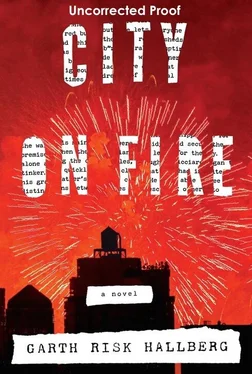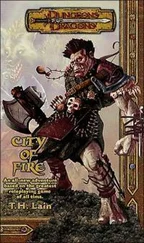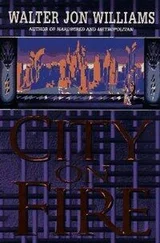“I know you’re annoyed,” Mercer said, “but could you try not to flounce?”
“Was I flouncing?” William asked.
“You’re drawing stares.”
As friends or even neighbors, they were an unlikely pair, which may have been why the man who ran the Boy Scout tree lot by the Lincoln Tunnel on-ramp had been so hesitant to touch their cash. It was also why Mercer could never have invited William home to meet his family — and thus why they were having to celebrate Christmas on their own. You knew it just to look at them, the doughy brown bourgeois, the wiry pale punk: What could possibly have yoked these two together, besides the occult power of sex?
It was William who’d chosen the biggest tree left on the lot. Mercer had urged him to consider the already severe overcrowding of the apartment, not to mention the half-dozen blocks between here and there, but this was William’s way of punishing him for wanting a tree in the first place. He’d peeled two tens from the roll he kept in his pocket and announced sardonically, and loud enough for the tree guy to hear, I’ll take bottom. Now, between fogged breaths, he added, “You know … Jesus would’ve cast us both into the fiery pit. That’s in … Leviticus somewhere, I think. I don’t see the point of a Messiah who sends you to hell.” Wrong Testament, Mercer might have objected, besides which we haven’t sinned together in weeks, but it was imperative not to take the bait. The Scoutmaster was only a hundred yards back, the end of a trail of needles.
Gradually, the blocks depopulated. Hell’s Kitchen at this hour was mostly rubbled lots and burnt-out auto chassis and the occasional drifting squeegee man. It was like a bomb had gone off, leaving only outcasts, which must have been the neighborhood’s major selling point for William Hamilton-Sweeney, circa the late ’60s. Actually, a bomb had gone off, a few years before Mercer moved in. A group with one of those gnarly acronyms he could never remember had blown up a truck outside the last working factory, making way for more rattletrap lofts. Their own building, in a previous life, had manufactured Knickerbocker-brand breathmints. In some ways, little had changed: the conversion from commercial to residential had been slapdash, probably illegal, and had left a powdered industrial residue impacted between the floorboards. No matter how you scrubbed, a hint of cloying peppermint remained.
The freight elevator being broken again, or still, it took half an hour to get the tree up five flights of stairs. Sap got all over William’s jacket. His canvases had migrated to his studio up in the Bronx, but somehow the only space for the tree was in front of the living area’s window, where its branches blocked the sun. Mercer, anticipating this, had laid in provisions to cheer things up: lights to tack to the wall, a tree skirt, a carton of nonalcoholic eggnog. He set them out on the counter, but William just sulked on the futon, eating gumdrops from a bowl, with his cat, Eartha K., perched smugly on his chest. “At least you didn’t buy a crèche,” he said. It stung in part because Mercer was at that moment rooting under the sink for the wiseman figurines Mama had enclosed with her care package.
What he found there instead was the mail pile, which he could have sworn he’d left sitting out in plain view on the radiator this morning. Usually, Mercer wouldn’t have stood for it — he couldn’t walk by one of Eartha’s furballs without reaching for the dustpan — but a certain unopened envelope had been festering there for a week among the second and third notices from the Americard Family of Credit Cards, redundancy sic, and he’d hoped today might be the day William finally awoke to its presence. He reshuffled the pile again so that the envelope was on top. He dropped it back onto the radiator. But his lover was already getting up to splash ’nog over the clump of green gumdrops, like some futuristic cereal product. “Breakfast of champions,” he said.
THE THING WAS,William had a kind of genius for not noticing what he didn’t want to notice. Another handy example: today, Christmas Eve 1976, marked the eighteen-month anniversary of Mercer’s arrival in New York from the little town of Altana, Georgia. Oh, I know Atlanta, people used to assure him, with cheery condescension. No, he would correct them— Al -tan- a —but eventually he stopped bothering. Simplicity was easier than precision. As far as anyone back home knew, he’d gone north to teach sophomore English at the Wenceslas-Mockingbird School for Girls in Greenwich Village. Underneath that, of course, there’d been his searing ambition to write the Great American Novel (still searing now, though for different reasons). And underneath that … well, the simplest way to put it would have been that he’d met someone.
Love, as Mercer had heretofore understood it, involved huge gravitational fields of duty and disapproval bearing down on the parties involved, turning even small-talk into a ragged struggle for breath. Now here was this person who might not return his calls for weeks without feeling the slightest need to apologize. A Caucasian who waltzed around 125th Street as if he owned the place. A thirty-three-year-old who still slept until three p.m., even after they started living together. William’s commitment to doing exactly what he wanted, when he wanted, had at first been a revelation. It was possible, suddenly, to separate love from being beholden.
More recently, though, it had started to seem that the price of liberation was a refusal to look back. William would talk in only the vaguest terms about his life pre-Mercer: the period of heroin dependency in the early ’70s that had left him with his insatiable sweet tooth; the stacks of paintings he refused to show either to Mercer or to anyone who might have bought them; the imploded rock band whose name, Ex Post Facto, he’d annealed with a wire hanger into the back of the motorcycle jacket. And his family? Total silence. For a long time, Mercer hadn’t even put together that William was one of those Hamilton-Sweeneys, which was sort of like meeting Frank Tecumseh Sherman and not thinking to inquire about any kinship to the General. William still froze whenever anyone mentioned the Hamilton-Sweeney Company in his presence, as though he’d just found a fingernail in his soup and was trying to remove it without alarming his tablemates. Mercer told himself his feelings wouldn’t have changed one jot if William had been a Doe or a Dinkelfelder. Still, it was hard not to be curious.
And that was before the Lower School’s Interfaith Holiday Pageant earlier this month, which the Dean of Students had stopped just short of requiring all faculty to attend. Forty minutes in, Mercer had been trying to distract himself with the program’s endless cast list when a name had leapt out at him. He ran a finger over the type in the weak auditorium light: Cate Hamilton-Sweeney Lamplighter (Children’s Chorus). He generally kept to the Upper School — at twenty-four, he was its youngest teacher, and the only Afro-American to boot, and the littler kids seemed to view him as some kind of well-dressed janitor — but after the curtain calls, he sought out a colleague who taught in the kindergarten. She indicated a cluster of ecumenical sprites near the stage door. This “Cate” was apparently one of them. I.e. one of her own. “And do you happen to know if there’s a William in her family?”
“Her brother Will, you mean? He’s in fifth or sixth grade, I think, at a school uptown. It’s coed, I don’t know why they don’t send Cate, too.” The colleague seemed to catch herself. “Why do you ask?”
“Oh, no reason,” he said, turning to go. It was just as he’d thought: a mistake, a coincidence, one he was already doing his best to forget.
Читать дальше












